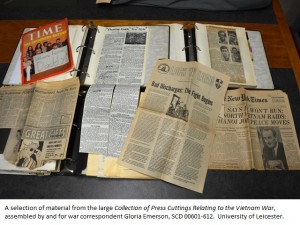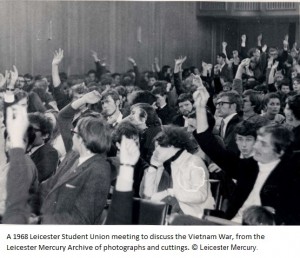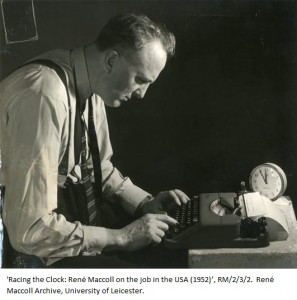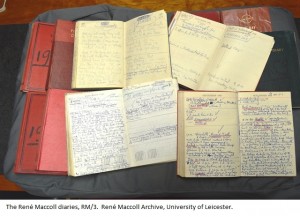Fifty years ago, in October 1965, mass demonstrations against the Vietnam War took place in the US and pacifist David J. Miller burnt his draft card, becoming the first person to be convicted and eventually imprisoned for doing so. For anyone interested in making a study of the protest movement, the Special Collections at Leicester contain some absorbing material.
An extensive [Collection of press cuttings relating to the Vietnam War … covering the period of the Vietnam War from 1965 to June 1974] was donated by Nicholas Cull, Professor of American Studies at Leicester from 1997 to 2005. The collection was assembled by and for Gloria Emerson, pioneering and formidable woman war correspondent for the New York Times, who won awards for her impassioned reports describing the sufferings of ordinary civilians – and soldiers – caught up in the war. It contains cuttings from all the major US newspapers, but also some rarer publications, for example a complete 1973 copy of Lock and Load, ‘written by and for Vietnam era veterans … all members of Vietnam Veterans Against the War’.

A selection of material from the large Collection of Press Cuttings Relating to the Vietnam War, assembled by and for war correspondent Gloria Emerson, SCD 00601-612.
A member of the Catholic Worker Organization, David J. Miller was arrested three days after burning his draft card. ‘Mr Miller, a neat, blond 22-year-old in a conservative gray suit,’ the New York Times reports, ‘brought an electric silence to an antiwar rally in New York Friday afternoon when he mounted a makeshift platform atop a truck and held up his draft card. Smiling nervously, he struck a match, which immediately went out. A cigarette lighter was passed up from the crowd, and shielding the flame with his body, he set the card ablaze, amid wild cheers from his supporters. A hostile crowd … shouted “treason” and “he’s a beatnik”.’1
At this stage, the majority of Americans still supported government policy in Vietnam and the vociferous minority of liberal protesters comprised mainly students, artists and intellectuals and ‘hippies’ – although this would change dramatically over the next couple of years. Letters and interviews from the NYT illustrate this bitter division of opinion forcefully. A University of Arizona student writes: ‘If there was a way for the decent, broad-minded and objective young adults of this country to be heard … we could do away with a lot of this yellow-bellied Communist-influenced demonstration wave against our Vietnam duty … I support our involvement in that country or in any other country where the need may arise’. 2 Draft rules stated that call-up for those over 19 but in full-time education would be deferred on a year-to-year basis. ‘It’s really terrible that college has become a way of avoiding being shot at,’ a Florida State student tells the National Observer, ‘… a giant protection agency for yellow-bellied chickens.’3
The Special Collections also house the René Maccoll Collection, which includes correspondence, cuttings, manuscripts and diaries. Author and journalist Maccoll joined the Daily Express after World War II as a foreign correspondent and covered the war in Vietnam, along with many other key events of the period. His diaries describe his visits to Vietnam in July 1965 and August 1967. On 22 July 1965, he writes: ‘Went on flare-drop with the 309th Air Commando Unit. Quite interesting and yielded a good leader page’4. This article, also in the Collection, explains that the C-123 plane, named ‘Sweet Laura’, carried out nightly flare-dropping patrols over Vietcong guerrilla positions to ‘keep the little old scene well lit up’5, in the words of one of the crew. On 27th, Maccoll visited the US Air Base at Da Nang and was allowed to fly on an ‘In-Country Strike’. An accomplished flier himself, Maccoll seems to have found the experience exhilarating, rather than disturbing. ‘Oh boy!’ he writes, ‘That dive-bombing! Was made a life-long honorary member of something or other.’4
During his 1967 visit, on the eve of presidential elections, Maccoll attended a party at the Independence Palace in Saigon, where he met Nguyễn Văn Thiệu, previously chief of state in a military-led junta and unsurprisingly victor in the following day’s election. ‘What about mining of Haiphong Harbor and the bombing of Central Hanoi?’ asks Maccoll. ‘This is militarily necessary,’ is the reply. ‘A 5 ft. high, brown-faced, well-groomed, rather charming chap,’ Maccoll comments, ‘handsome, compact face’.6
Interestingly, the Leicester Student Newspaper Ripple (also held in the Special Collections) contains little

1968 Leicester Student Union meeting to discuss the Vietnam War, from the Leicester Mercury Archive of photographs and cuttings.
evidence of protests during the 1960s by students here against US involvement in Vietnam – although, of course, that doesn’t mean that it didn’t happen (as the 1968 photo here from the Leicester Mercury demonstrates). On 13 May 1965, under the sardonic headline ‘God Bless America’, C.J. Price writes, ‘Leafing through the scandal sheets put out by our competitors … I noticed that not one of them has a good word to say for our staunch and noble ally bogged down in the swamps of Vietnam … Three cheers for Johnson’s courageous action in rushing the marines there … Of course, if he had any sense, he would stop mucking about and colonise the lot of it.’7 The 2 November 1967 issue reports claims by two Leicester students, who had taken part in the recent anti-Vietnam war demonstration outside the US embassy in Grosvenor Square, that they were ‘victims of police brutality’.7
Special Collections welcomes students, researchers, staff and visitors who wish to consult the University of Leicester’s collection of rare books, archives and manuscripts. To arrange a visit to consult the press clippings or Maccoll Archive, please email us at specialcollections@le.ac.uk for more information. Both collections would provide excellent source material for dissertation projects, and undergraduate students are particularly encouraged to contact us.
- [Collection of Press Cuttings Relating to the Vietnam War …], Vol. 1, (19 October 1965), SCD 00601.
- Ibid. (24 October 1965)
- Ibid. (25 October 1965)
- René MacColl’s diary for 1965, RM/3/8
- ‘Mission with Sweet Laura’ from the Daily Express, (24 July 1965): Rene MacColl’s photographs and press cuttings, RM/2/3
- René MacColl’s diary for 1967, RM/3/10
- Ripple: Leicester University Student Newspaper, (13 May 1965 & 2 November 1967), SCH 00127A




 Subscribe to Margaret Maclean's posts
Subscribe to Margaret Maclean's posts
Recent Comments